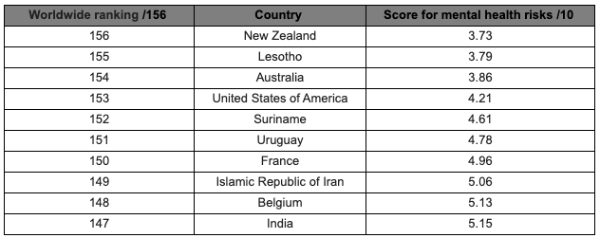Study Reveals Countries With Highest Risk Of Mental Health Crisis As Lockdowns Ease, NZ Ranks Last
Today, open conversation about mental health is encouraged and as a result, more people are seeking help. However, even before the Coronavirus pandemic hit, significant care deficits in mental health were unfortunately commonplace.
According to The Lancet, on top of this existing pressure, the COVID-19 pandemic has disrupted the delivery of mental health services and the psychosocial burden of lockdown, job losses and deaths of loved ones will become evident in the coming months.
With this in mind, Dr Earim Chaudry the Medical Director at the wellbeing platform Manual, has studied rates of mental health disorders, substance abuse and suicides globally as part of a wider health study of 156 countries worldwide.
The findings highlight which nations could see the largest surges in mental health cases as we enter the next stage of the pandemic.
When looking at the mental health risks worldwide, New Zealand scores the poorest, ranking in last place out of the 156 countries included:

While New Zealand is considered a model nation for its quick response to stopping the spread of the Coronavirus, research has shown that 80 percent of surveyed New Zealanders experienced feelings of anxiety and loneliness during its short lockdown. On top of this, there was a 40 percent increase in call volumes to mental health helpline ‘1737 Need 2 Talk’ in April alone.
Before the virus, New Zealand already had an alarmingly high suicide rate, with 685 people taking their own lives in 2019 to the beginning of July.
Australia placed 154th in the world’s mental health rankings and research has shown that almost half (45 percent) of Australians will experience a mental health problem in their lifetime.
What’s more, Australia is now set for its first recession in three decades, as a result of serious bushfires and the economic impact of COVID-19 shutdowns, putting lifestyles and livelihoods at risk.
In fourth place is the U.S (153rd/156). Pre-COVID-19, the country’s “broken system” for mental health was widely cited as being underfunded and overburdened. Anxiety alone affects 18 percent of the US population, that’s around 40 million people.
With the highest infection rate globally and civil unrest sweeping the nation, the U.S is likely to experience a huge surge in people needing to access mental health services as lockdowns ease.
In Europe**, France has the poorest mental health record. Before the pandemic, 1 in five people in France experienced a mental health problem which required treatment and shortages of staff, hospital places and resources were frequently reported.
Alongside its European neighbours Spain and Italy, French citizens have endured one of the world’s strictest lockdowns to help slow the spread of the Coronavirus. The country has recently begun a second phase of easing lockdown rules as COVID-19 figures continue to fall. However, like in many countries, social distancing measures and restrictions on travel continue.
The other countries in the bottom 10 are made up by Lesotho (3.79), Suriname (4.61), Uruguay (4.78), Iran (5.06), Belgium (5.13) and India (5.15). The latter has a staggering 90 million people suffering from mental health problems, 7.5 percent of the country’s population, according to the WHO.
Dr Earim Chaudry, Medical Director at Manual commented on the findings:
“It really is eye-opening to see which countries have the highest rates of mental health disorders, substance abuse and suicides, and explore how the COVID-19 pandemic could escalate these figures.
“It’s important governments and healthcare providers plan for an increase in mental health disorders as we enter the next phase of the coronavirus pandemic and allocate sufficient resources to ensure a high standard of care.
“Everyone no matter their gender, age or background, should own their mental health by accessing the support available to them and speaking to a medical professional as soon as symptoms appear.”
The full findings of the global study into mental and physical health risk factors can be explored on the study’s dedicated webpage here.
**Comparison of 37 European countries includes Russia.


 Bowel Cancer NZ: Broken Promise, Lost Lives - Govt’s Bowel Cancer Screening Pledge 98% Undelivered
Bowel Cancer NZ: Broken Promise, Lost Lives - Govt’s Bowel Cancer Screening Pledge 98% Undelivered NZFC: Apply For The New Zealand Film Commission’s He Kauahi Catalyst
NZFC: Apply For The New Zealand Film Commission’s He Kauahi Catalyst  Organ Donation NZ: Organ And Tissue Donation Helped Save And Improve The Lives Of Hundreds Of People In 2024
Organ Donation NZ: Organ And Tissue Donation Helped Save And Improve The Lives Of Hundreds Of People In 2024 Taupo District Council: Punarua Exhibition Arrives At Taupō Museum
Taupo District Council: Punarua Exhibition Arrives At Taupō Museum Office of Early Childhood Education: Teachers Are Paying The Price For Lack Of ECE Funding In The Budget
Office of Early Childhood Education: Teachers Are Paying The Price For Lack Of ECE Funding In The Budget Science Media Centre: Teen Dies After Controversial Tackle Game – Expert Reaction
Science Media Centre: Teen Dies After Controversial Tackle Game – Expert Reaction